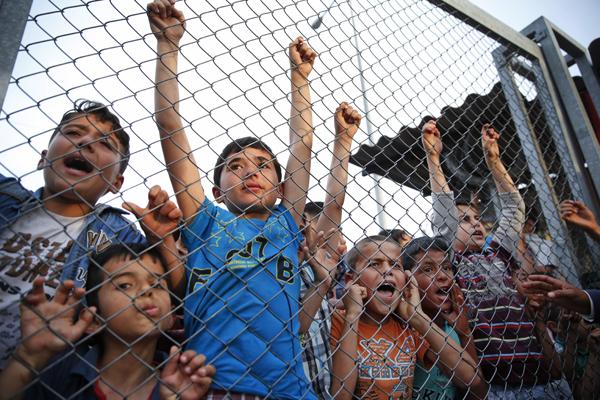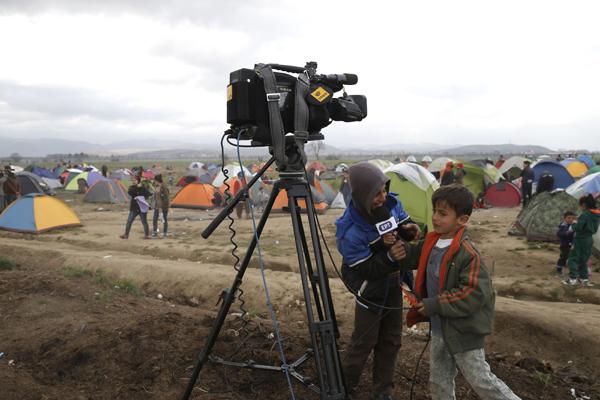You are here
EU’s Turkey migration deal hinges on Cyprus — Tusk
By Reuters - Mar 16,2016 - Last updated at Mar 16,2016

A refugee woman walks through the mud, carrying tea and bread as others are waiting in line, in a makeshift camp at the northern Greek border post of Idomeni, on Wednesday (AP photo)
BRUSSELS — The European Union warned on Wednesday that a deal with Turkey to curb mass migration to Europe hinges on Ankara acting to support peace talks in EU member Cyprus.
European Council President Donald Tusk, who will chair an EU summit on Thursday and Friday, said much remained to be done to reach a deal with Turkey.
"Work is progressing but there is still a lot to do," he said in a letter to EU leaders. The migration deal needed to be "an opportunity [for Turkey]to support the settlement talks in Cyprus. Only if this is possible can we move forward here".
EU officials offered last-minute tweaks to the draft pact with Turkey in an effort to make it legally watertight, but a stand-off with Cyprus could yet scupper any deal this week.
Under a tentative agreement reached last week, Ankara would take back all migrants and refugees who enter the EU from its shores or are detained in its territorial waters, in return for more money, faster visa-free travel for Turks and a speeding up of its slow-moving EU membership negotiations.
For its part, the EU would admit one legal Syrian refugee directly from Turkey for each one trying to reach Europe by boat and taken back by Turkey from the Greek islands in a step meant to wreck the business model of people smugglers.
But Cypriot President Nicos Anastasiades has threatened to veto any progress in Turkey's accession talks unless Ankara meets its obligation to open Turkish ports and airports to Cypriot traffic, effectively recognising his state.
"We are certainly not giving Turkey a free ride," European Commission Vice President Frans Timmermans said. Ankara would have to enact a raft of measures within six weeks if Turks were to get visa-free travel to the 26-nation Schengen area in June.
German Chancellor Angela Merkel is pushing hardest for the deal after suffering heavy losses in regional elections on Sunday due to public anger over an uncontrolled influx of more than 1 million migrants into Germany last year.
Merkel told parliament in Berlin on the eve of the Brussels summit that no one should be "deceived" by a relative lull in arrivals since Austria and Balkan countries shut their borders.
More than 43,000 migrants and refugees are bottled up in squalid conditions in Greece after the former Yugoslav Republic of Macedonia closed its border, and more are arriving daily despite NATO's Aegean sea patrols.
"The current easing that Germany and some other member states are experiencing is one thing. The situation in Greece is the other, and it must be a big concern to us all because it is not without consequences for us all in Europe," Merkel said.
An agreement with Turkey would need to be followed by a deal among EU countries to accept quotas of refugees, she said, something several central European states have so far rejected.
Tusk has drafted a set of principles to overcome legal and political objections to the deal, including an assurance against blanket mass returns of migrants.
"This will be a temporary and extraordinary measure which is necessary to end the human suffering and restore public order," a draft document seen by Reuters said.
Migrants arriving on Greek islands would be duly registered and entitled to apply for asylum in Greece, it said, and their applications would be processed in accordance with EU rules.
People returned to Turkey would be protected in line with international standards for refugees, even though Ankara applies the Geneva Convention formally only to people fleeing Europe.
Cyprus and Turkey have been at loggerheads since a 1974 Turkish invasion of the island.
Nicosia could also try to block visa liberalisation for Turks since the EU conditions include the principle of equal treatment of all member states. It does not have a veto on the visa issue, but it could find allies among reluctant countries such as France, Spain and Austria.
The EU leaders are due to meet Turkish Prime Minister Ahmet Davutoglu on Friday morning to finalise the deal.
But European Parliament President Martin Schulz, reflecting the feelings of many lawmakers deeply uneasy about Turkey's human rights record, told Germany's Funke media group he did not expect a "final breakthrough" this week.
Related Articles
BRUSSELS — European Union leaders met on Thursday seeking agreement with Turkey to stop migrants reaching Greece and voiced a mix of hope fo
GAZIANTEP, Turkey — Turkey stood its ground over the contentious issue of visa-free travel for its citizens on Saturday, warning German Chan
BRUSSELS — Turkey ratcheted up its demands for helping the European Union with the migrant crisis at a high-stakes summit in Brussels on Mon














